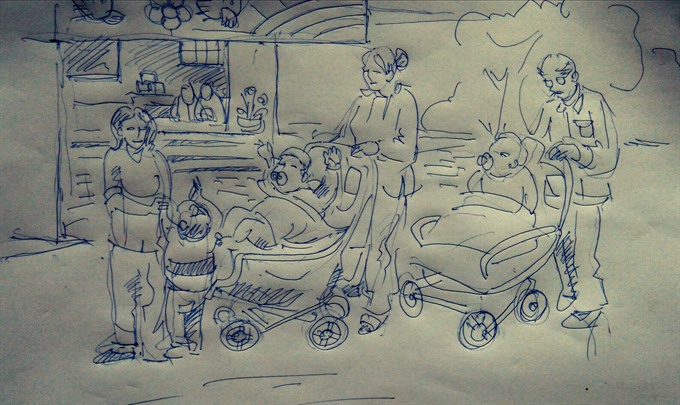 Talk Around Town
Talk Around Town

I think the Ministry of Education and Training is too ambitious by suggesting that nursery schools receive children who are only three-months' old.
 |
| Illustration by Đào Minh Chí |
Bích Hường
I think the Ministry of Education and Training is too ambitious by suggesting that nurseries receive children who are only three-months’ old.
According to the ministry’s draft of amended Law on Education, which is expected to be included in the National Assembly’s agenda this year, nurseries will be encouraged to accept children from three months to below six years.
Existing rules already say that three-month-old babies can attend nurseries, but in practice this has never happened because of a lack of facilities.
Those drafting the proposal say that it will meet demands from some families who have children under six months and help ensure proper rights and care for the infants. They also hope that the law will stay true for a long time, or in other words, be framed so that it avoids any immediate corrections.
But I can not agree. A law with a long vision doesn’t mean leaving it unchanged if it does not work smoothly.
Existing problems in nurseries force myself, and others, to speak out about the shortage of pre-schools and properly trained teachers, overcrowded classes, poor infrastructure, and most alarming, child abuse.
Parents with pre-school-age children tell me they are struggling to decide if their children are ready to attend a nursery, which one is suitable for their child - and how much it will cost.
Lê Thu Trang, a mother of a six-months-old baby said, it was a hard decision for her, especially when I heard about child abuse and even brutality towards children by nannies and caretakers at kindergartens.
“A baby as young as three months old is too young to be taken care of by anyone apart from its mother. If there are no problems about family finances, few mothers would want to send their children to daycare earlier than the age of 12 to 18 months,” Trang said.
Trang’s concerns are more than reasonable, that’s why I am so opposed to the education ministry’s proposal about accepting three-month-old babies.
In reports in the media this month, head of Pre-school Education, Nguyễn Bá Minh, said that many families wanted to find daycare for their babies and then return to work because they needed the money.
Since 2013, working mothers in Việt Nam have been given six months’ maternity leave - an extra two months. Like in some Western countries, many mothers leave work two to three months before giving birth - and resume work when their babies are just three or four months’ old.
Minh insisted that allowing nursery schools to receive three-month old babies was appreciated by some families.
Nguyễn Bích Hạnh, a worker in Hà Nội’s Thăng Long Industrial Zone agreed. She said that she and her husband earned about VNĐ8 million (US$350) a month and that during maternity leave, her husband struggled to feed the family.
“I want to send my child to daycare so that I can resume work early,” Hạnh said, noting that it was difficult to find reliable daycare for infants.
Pre-school education chief Minh admitted that most nursery schools in Việt Nam did not have sufficient facilities or qualified teachers to take care of infants.
Education ministry deputy minister Nguyễn Thị Nghĩa told on-line newspaper Dân trí that HCM City was piloting a programme to help public nurseries to receive six-month old babies.
Few places in Viet Nam will be able to follow HCM City because they lack sufficient infrastructure. As a result, many parents send their young children to private daycare centres, even illegal ones, Nghĩa said.
While Nghĩa is talking about caring for six-month-old children, don’t forget that the ministry proposal is talking about three-month-old infants who require much more care and specialised conditions.
It is well known that the nursery system in Việt Nam fails to meet social expectations because of modest infrastructure, lack of school facilities and understaffing.
Cities and provinces across the country complain about a shortage of pre-school teachers, while working teachers complain about their overloaded and stressful work conditions.
In Hà Nội, most public pre-schools (nurseries) in the city refuse to accept children under 12 months’ old. In the last few years, many nurseries have organised lucky draws at the beginning of the school year to select those that they have room to admit.
On average, there are usually about 50 children with two or three teachers in each class in nurseries in inner-city districts.
Head of the education department in Tây Hồ District, Lê Hồng Vũ, said the ministry’s proposal to accept three-month old children was impractical at present.
Infants at such a young age required special diets and care, let alone breastfeeding, Vũ said, adding that when providing care to infants, schools must have a health officer to deal with unusual risks to infants.
Pre-school teachers were not trained to take care of three-month-old infants and some teachers lacked maternity experience, so they had difficulty dealing with such young children, he said
Thanh niên (Young people) newspaper said few schools wanted to offer services for babies because of high investment and the risks.
It is said that at three months, babies learn about love, reliability, trust and overcome their fears. Mothers are the babies’ first teachers and company. I appreciate the ministry’s proposal, but it shows us that proper preparations would be needed to translate it into reality. The proposed regulation is impractical! — VNS




